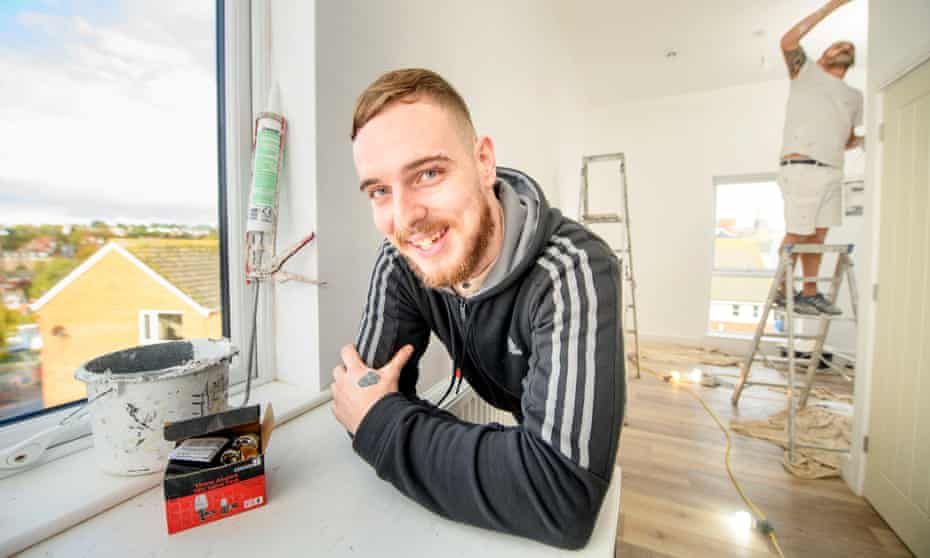Home-seekers despair as affordable property vanishes from UK hotspots
12-27-2021
Lockdown exodus from big cities further complicates housing crisis in attractive parts of the country
Jonathan Taylor may be one of the lucky ones. YMCA Exeter is converting a Poundstretcher warehouse into affordable homes for young people. Photograph: Adrian Sherratt/The Guardian
Robert Booth Social affairs correspondent
Jonathan Taylor may be one of the lucky ones. YMCA Exeter is converting a Poundstretcher warehouse into affordable homes for young people. Photograph: Adrian Sherratt/The Guardian
Robert Booth Social affairs correspondent


Jonathan Taylor was pleased by his first peek at a sparkling new studio apartment that could one day become his home. The 24-year-old from Exeter has been living in YMCA accommodation since he was 19 but, as he viewed freshly painted white walls, the reality of a more settled home dawned.
“If I lived in this place I’d feel more important,” he said. “I’d feel I’ve landed on my feet.”
Taylor, who juggles cleaning jobs at a builders’ merchant and a pub, is a victim of what many fear is a deepening housing crisis in the Devon cathedral city fuelled by surging house prices, the spread of short-term Airbnb lets and rising social waiting lists.
AdvertisementIt means the chance to rent a decent, affordable home like the one Taylor is viewing is vanishingly rare. The fact Taylor may soon be given a chance to move in is down to YMCA Exeter, which is converting a former Poundstretcher warehouse into 26 homes for priced-out young people for a £140-a-week rent – well below the market rate.
The small attempt at a solution comes as Exeter and many other parts of the UK are facing a new challenge to further complicate the housing crisis: the arrival of metropolitan homebuyers seeking more space and less stress. Pandemic exiles are selling up high-value homes in places such as London and snapping up bigger properties for a fraction of the price.
Latest figures show that Londoners bought more than 112,000 homes outside the capital this year, an increase of 62% compared with 2020, according to the estate agent Hamptons.
They spent £54.9bn, the highest annual spend on record, reflecting soaring property prices, which have been lifted by the government’s temporary cut to stamp duty. The average UK house price has risen from £450,460 in 2020 to £486,890 in 2021.
“It is getting tense,” said Rob Hannaford, leader of the Labour group of Devon county council.
“People coming down with big budgets is causing anger and resentment.”
Exeter is among several UK areas that have become honeypots for city people who decided during the lockdowns that another life must be possible. House prices are surging too in Richmondshire in North Yorkshire, Pembrokeshire in west Wales, and the Scottish borders. Cities such as Exeter are seeing already threadbare supplies of affordable housing pushed to breaking point.
“Local people can’t get anywhere in the system,” said Hannaford. “People from London are coming in and putting in a ridiculous offer over the asking price and getting what they want. These might not be houses that local people could afford, but it does trickle down.”
Exeter’s social waiting list grew 47% from 2017 to 2020 to reach about 2,600 households. House prices went up 8.5% in the last year. Meanwhile the population grows, more properties become second homes and private landlords increasingly switch long-term rentals to short-stay Airbnbs.
The pressure is such that Hannaford said the council was even concerned about how to find homes for 67 Afghan refugees currently in a hotel after this summer’s evacuation from Kabul. Attracting social workers, teachers and care workers is becoming harder. There is a plan to build 500 council homes but it is playing catch-up.
Blaming the arrival of outsiders may not be entirely fair given the affordable housing crisis in Exeter has been brewing for years. Landlords have bought up swathes of stock to rent to students and, in a nationally recurrent theme, there is public opposition to construction on the surrounding green fields.
Newcomers resist any suggestion they are causing a problem and some stressed they wanted to become part of the community and contribute with their different skills and experience.
“The pandemic and lockdown gave us some unexpectedly clarity,” said Sabrina Russo, who moved from London to Exeter with her family in December 2020. “We realised that a bigger home, time outdoors and a slower pace had become real priorities … Exeter is friendly and welcoming and we’ve started to meet people and make friends. We bought a house that we love.”
But, said Laura Wright, the Exeter city councillor in charge of council housing and deputy leader, there was “growing alarm at the prices that some people are willing and able to pay to move here from London”.
“As a nation, we have been locked into a way of thinking and acting over the last 20 years which values making the biggest profit possible above collective responsibility for social cohesion and welfare.”
The sharpest house price rises in the year to August have been in desirable, more spacious locations outside the major cities where there have also been substantial increases in people waiting for social housing. The list includes Wychavon, Stratford-upon-Avon, County Durham, Cheshire West and Newark and Sherwood in Nottinghamshire. In these places, average house prices rose between 13% and 20% in a year while waiting lists have lengthened over the last three years.
“My age group is being pushed out of the city,” said Natalie Overson, a 23-year-old who aspires to be a midwife and has been on Exeter’s social housing waiting list for five years. “A lot of it is people buying second homes, or buying to rent out. It is the middle and upper classes that are making it harder for us to live in the cities we grew up in.”
Becky Merriman, 34, a youth worker, has been unable find a rental home in Exeter, which means she has to commute 40 minutes each way and continue to live with her parents.
“I’ve been trying since May and it has been quite traumatic,” she said. “We would ring agents as soon as a property went up [online] and they would say the viewings were all gone in 10 minutes. It’s mentally exhausting.”
In West Devon, which includes half of Dartmoor, house prices have risen 20% in the last year and 800 households are waiting for social housing.
“We as a local authority have got to be building houses,” said Neil Jory, West Devon’s Conservative leader, who added that people moving from London and Bristol was “causing us a great deal of concern”. “There are cases in Devon where teachers have come to the county to work and three months later they have gone back to where they came from because they can’t afford anywhere to live.”

